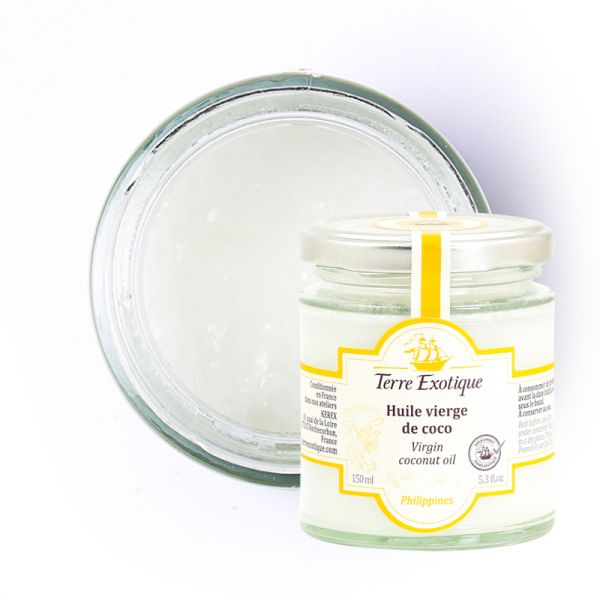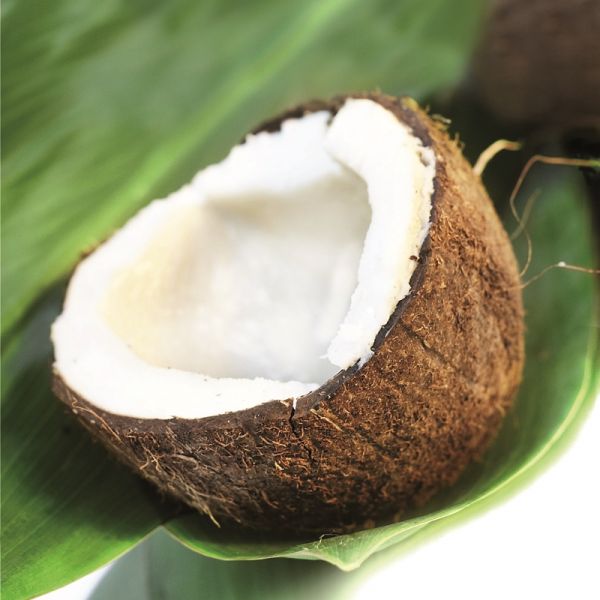





How to Cook with Coconut Oil
Use it as a substitute for butter or other oils in your recipes. It's perfect for high-temperature cooking due to its thermal stability, making it ideal for stir-fries, baking, and frying. Our favorite pairing? Spicy shrimp—delicious! Its light coconut flavor can also add an exotic touch to smoothies and desserts.
Recipe Ideas for Cooking with Coconut Oil
- Coconut Vegetable Stir-Fry: Use coconut oil to sauté seasonal vegetables, adding spices like curry, and serve with warm rice;
- Coconut Grilled Chicken: Marinate chicken pieces in coconut oil with lemon and herbs before grilling;
- Coconut Cookies: Replace butter with coconut oil in your cookie recipes to enhance their soft texture;
- Tropical Smoothie: In a blender, mix frozen mango with banana and add a spoonful of coconut oil. Blend it all together.
Check out Terre Exotique’s Kerala Fish Curry recipe
A Tropical Sweetness with Terre Exotique Coconut Oil
Coconut oil is known for its mild and pleasant aroma of fresh coconut. It has a subtle, slightly sweet flavor that can bring an exotic dimension to your dishes. Its light, silky texture melts easily, providing tropical sweetness without being too greasy.
How Coconut Oil is Made
Coconut oil is made from fresh coconut pulp, manually harvested and cold-pressed to preserve its natural properties. This process ensures a pure virgin oil without additives or chemicals. The production follows traditional methods to ensure exceptional quality and authentic flavor:
- - The pulp is grated into very fine strips
- - The strips are quickly dried at a controlled temperature not exceeding 27°C
- - Finally, they are cold-pressed in screw presses.
Coconut oil is extremely stable with an unlimited shelf life. It solidifies below 22°C.
The History of Coconut Oil
The coconut palm is one of the oldest trees in the world. The coconut was brought from Southeast Asia by Marco Polo, who named it the "Pharaoh's fruit." He described it as a delicious fruit, sweet like sugar and white like milk. He marveled at its dual functionality, both solid for food and liquid for drink. Coconuts are natural wanderers. After six months of growth on the coconut palm, they fall, float thanks to the fibrous part of their shells containing a lot of air, and drift from island to island.
| Price/kg | 600 |
|---|---|
| Allergen | Absence |
| Native country | NON UE |
| Genus and botanical species | Cocos nucifera |
| Ingredients | 100% virgin coconut oil |
| Nutritional Info | VN Energie pour 100 g (energy for 100g) : 3700 kJ / 900 kcal VN Matière grasse (fat) : 100 g Dont acide gras saturés (of which saturated fat) : 93 g VN Glucides (carbohydrate) : 0 g Dont sucres (of which sugars) : 0 g VN Protéines (protein) : 0 g Vn Sel (salt) : 0 g |
| Contenance | 150ml |
| TRACES EVENTUELLES D'ALLERGÈNES | céleri, sésame, moutarde, fruits à coques. |
 Français
Français 